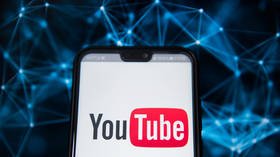‘Soft child-porn’ or honest political debate? Take a guess which one YouTube failed to censor

Despite employing a small army of ‘anti-extremist’ flaggers, YouTube somehow overlooked an entire prison block of pedophiles on its platform. Is the video-sharing site wasting too many resources censoring political content?
Last week, a regular guy named Matt Watson, working at his home computer, shook the wired world to its very foundations by providing convincing evidence that YouTube supports – either wittingly or unwittingly – a pedophile ring that openly preys on the most vulnerable members of society, children.
As Watson demonstrated, not only are these bottom feeders free to comment on videos that feature minors, but they also provide time stamps, presumably for the benefit of the wider pedophile community, indicating exactly when the children can be seen in their most compromising positions. They also actively promote links to porn sites that cater for these twisted minds.
Also on rt.com Major advertisers jump ship as YouTube hit with ‘softcore child porn’ scandalThe discovery prompted some of the most popular corporate brands, including Disney and Nestle, to bolt for the emergency exits after it was discovered their ads were running alongside the work of sexually depraved deviants. Needless to say, not the best business model.
Aside from the lewd comments accompanying the videos, which is not overly surprising considering the planet’s high creep factor, one of the most disturbing revelations is how ‘user friendly’ YouTube has become for pedophiles. Watson showed how Google-owned YouTube, through no more than a couple mouse clicks, navigates users to a frolicking playground where the sidebar is loaded with nothing but children-themed videos, a virtual pedophile paradise. But it gets more disturbing.
Once a user has entered this “wormhole,” as Watson calls it, there are no alternative video options available for escaping from it. A user will not even find ‘awareness’ videos, for example, that discuss the threat of child predators. In other words, once the user makes it to YouTube’s children video section it is game over, so to speak, unless he or she physically activates a new search.
The reason that this scandal makes no sense is that YouTube has known about its pedophile problem for years. Back in 2017, advertisers were fleeing the platform for the very same reason they are today – their ads were being featured next to scantily clad girls, as well as the predictable depraved comments. Today, algorithm technology is so advanced that Google Maps, for example, is able to blur out the faces of every single person’s image that is captured by its Google Street View. Yet somehow YouTube appears to be technologically handicapped when it comes to finding ways to combat online pedophiles. Why is that?
READ MORE: YouTube says it ‘accidentally’ shut down conservative channels
One possible explanation is that Google and YouTube, as well as the majority of other IT companies, have become overly attentive to politics at the expense of everything else – and more so ever since Donald Trump ‘stole’ the White House from the Democratic darling Hillary Clinton.
First, it is important to state the obvious: Silicon Valley is to Liberals what Yankee Stadium is to the New York Yankees. In other words, the holy of the holies. To quote Mark Zuckerberg, the CEO of Facebook, Silicon Valley, the home to hundreds of IT companies, is an “extremely left-leaning place.” Twitter CEO Jack Dorsey, meanwhile, admitted that his company is so liberal that conservative employees “don’t feel safe to express their opinions” in the workplace.
Also on rt.com What is ‘reputable’ news? YouTube plans to decide for youGiven this blatant liberal predilection within the industry, who do you think Google and YouTube teamed up with to police its content from ‘extremist’ (i.e. conservative) content? Certainly not far-right groups.
In 2017, YouTube doubled the size of its so-called ‘Trusted Flaggers’ program, which now partners with over 100 organizations, the full member list of the program remains confidential. Among the few members that have been made public, however, including the Anti-Defamation League (ADL), No Hate Speech and the Southern Poverty Law Center (SPLC), they could best be described as ‘extremist’ in their liberal ideology. Meanwhile, as the Wall Street Journal reported, “less than 10 of the slots are filled by government agencies.”
Ironically, given the nature of this discussion, several of those agencies deal with “child-safety” issues.
Conservatives argue that the glaring lack of transparency with regard to the secretive ‘Trusted Flaggers’ program, combined with the IT industry’s well-known liberal affections, explains why so many right-wing and alternative news sites are being either demonetized, downgraded, or outright banned. And since we are talking about private businesses, these organizations have no legal obligation to uphold the Constitution’s First Amendment that guarantees ‘freedom of speech.’ They just casually shrug their shoulders and blame everything on the almighty algorithms. Yet, as even the most technologically handicapped person knows, algorithms were not magically conjured up out of thin air. Human beings, not robots (at least not yet), work tediously to develop them.
As just one example of the Orwellian atmosphere now pervading Planet Google, Jordan Peterson, a professor with a reputation for opposing political correctness, had one of his YouTube videos blocked in over two dozen countries last year. YouTube duly informed him that it had “received a legal complaint” about the video and decided to block it. Just like that!
The censors are at it again. No explanation -- and no reason: Why in the world would this be blocked? https://t.co/YMMw2BLPx8pic.twitter.com/xe7UnwPzGb
— Dr Jordan B Peterson (@jordanbpeterson) January 2, 2018
Only after a major outcry on multiple social media platforms, which included Twitter user Ethan Klein and his one million followers, did YouTube finally back down, while portraying the event as some sort of fluke that was “fixed.”
This isn’t the first time YouTube users have experienced “glitches” with the platform. Last year, it was forced to explain the mass removal of right-wing video channels, calling it a “mistake.” What is so strange about these technological breakdowns is that they always seem to affect conservative users. This snafu happened shortly after YouTube CEO Susan Wojcicki announced she was bringing on board – in addition to the so-called ‘Trusted Flaggers’ – some 10,000 moderators to crack down on rising occurrences of hate speech and – wait for it – “child safety.”
Does @YouTube understand about half the country is conservative? It's rather easy to find them for your team of screeners. https://t.co/Au9nuOcv2v
— Keith Barrett (@KeithBarrett) February 28, 2018
Meanwhile, Google can take draconian measures to downgrade RT and Sputnik, for example, over totally unfounded charges related to ‘Russiagate’ hysteria, yet they seem incapable of micromanaging the comments section in kiddie videos.
What this is intended to show is that YouTube does not hesitate to take deliberate steps to intervene in issues that matter most to them, which overwhelmingly seem to be of a political nature. Yet, when the welfare of children is at stake, the mini-surveillance state that the platform has built always goes missing in action, as it has now for many years.
How is it possible that one young man, working alone and without pay, is able to weed out a viper’s den of pedophiles from YouTube’s dungeon? Yet YouTube, with its army of ‘flaggers’ and moderators and government agencies, has failed to filter these miscreants for several years?
The sad reality is that the world of IT is totally consumed with politics, and politics is totally consumed with the world of IT, to the point where society’s most vulnerable are left at risk.
Unfortunately, parents must assume a great deal of vigilance against pedophiles when their children use the video sharing platform because YouTube has obviously dropped the ball on the issue and simply cannot be trusted. Like the rest of the IT kingdom, their heart is in politics, and that is it.
Like this story? Share it with a friend!
The statements, views and opinions expressed in this column are solely those of the author and do not necessarily represent those of RT.















